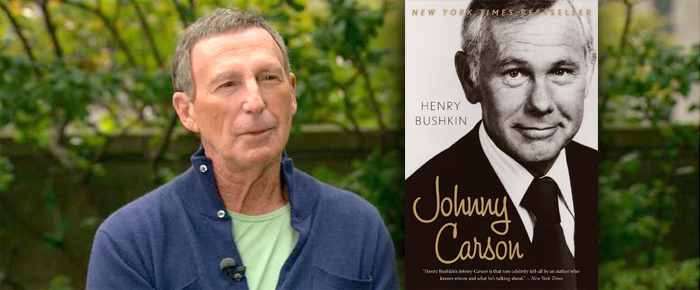
By Heidi Simmons
—–
Johnny Carson
by Henry Bushkin
Biography
—–
Joan Rivers had an amazing life as a comedienne and businesswoman. When she first performed on “The Tonight Show,” Johnny Carson immediately liked her. Rivers said she was grateful to Johnny for giving her the big break that launched her to stardom. But later, Carson also blackballed her, derailing her career for years. In Henry Bushkin’s Johnny Carson, (Houghton Mifflin Harcourt, 294 pages) Rivers is not the only one who suffered Carson’s wrath.
Author Bushkin was Johnny Carson’s personal attorney for eighteen years. In this biography of Carson, the reader gets an inside view of what it was like doing business with the superstar of television, the crowned King of Late Night.
Only 27 years old, Bushkin hadn’t been an attorney for long when he met Carson in 1970. He was an associate at a small New York entertainment law firm, married with a baby when he found himself swept up into Johnny Carson’s world. Carson was 45 years old.
On their second meeting, Bushkin accompanied Carson and a small group of armed-men to raid Carson’s second wife Joanne’s secret apartment. Their mission: To document evidence of an affair. Sadly, it was a success. The overwhelming evidence confirmed Johnny’s wife was indeed cheating on him. Bushkin watched Carson weep.
It was Bushkin who come up with the legal justification for the “break-in.” Since Joanne had no money of her own, the purchase of the love-nest came from Carson’s earnings and therefore was communal property. It would be the first of many clever legal maneuvers by Bushkin to help Carson protect his interests. Carson became Bushkin’s most important client and singular focus.
As the divorce against Joanne began, Bushkin realized Carson was cash poor. His earnings were being withheld by NBC as a tax strategy. But the tax laws had changed and Bushkin saw to it that Carson was compensated, thus putting millions of dollars into Carson’s coffers.
Besides doing business with Carson nearly everyday, Bushkin and Johnny played tennis together. In an interview, Carson said his best friend was Bushkin. This surprised and flattered Bushkin. Although he was the closest person to Johnny next to his wives, Bushkin never felt they were intimate friends.
When Carson married his third wife, Joanna, Bushkin became friends with her as well. She convinced Bushkin and his wife to move to Los Angeles. Joanna was astute enough to realize that Bushkin made Johnny happy and she wanted to keep Johnny in a good mood. When Carson was happy, he was a pleasant man, but when he was mad, everyone suffered. According to Bushkin, Carson could be up one minute and down the next.
Carson was born in 1925 and grew up in Nebraska. His moodiness was a result of growing up with a mother who was always unhappy. Johnny could never please her – not as a boy nor as a successful television personality. When she died, Bushkin says that Carson said, “The wicked witch is dead.”
This biography mainly focuses on Carson and his business dealings that Bushkin oversaw. At Carson’s request, Bushkin became a business partner with Johnny. Bushkin and his wife socialized and traveled with the Carsons. But, being wholly committed to Johnny was a 24/7 job, which took a toll on Bushkin’s own marriage.
Bushkin acted on Carson’s every whim. When Carson suddenly decided to quit “The Tonight Show” before his contract was up, Bushkin found a way out. When Coke-a-Cola offered $100 million to partner with Carson, Bushkin delivered the news that Carson wasn’t interested. It was Bushkin that negotiated Carson’s new NBC contract that gave Johnny ownership of the show, immediately quadrupling Carson’s worth. The only trouble was, Carson was no longer interested in business or money – now that he had so much of it.
Over the years, there were all kinds of business deals made: a Las Vegas hotel, Houston real estate and the purchase of a California bank. Bushkin oversaw it all, including the business of divorce. With Johnny’s third marriage failing, the business opportunities had to be carefully worked out. A deal made while still together with his wife would cost Carson half the profits.
There are plenty of times where Bushkin writes about Carson’s irresistible charm and incredible generosity. One of the best moments is when Johnny, Frank Sinatra and Bob Hope try to out do the other with the funniest joke.
The story of Rivers and her husband and manager Edgar Rosenberg is included. Rivers took a talk show with another studio and did not mention it to Carson until the deal was done. It destroyed their relationship since Carson was grooming her as a replacement. Carson never spoke to her again. Rivers was blackballed by Hollywood and Rosenberg took his life.
Carson married again. His wife Alex was less accepting of Bushkin and the feeling was mutual. Bushkin made a miss-step and Carson fired him in a quick three-minute visit. Their long relationship was over in 1988. Lawsuits followed and there was bad-mouthing of Bushkin by Carson, which was typical.
Just like Joan Rivers and so many others, once Johnny was done with Bushkin, there was no more communication. Years later Carson called Bushkin and for a moment Bushkin hoped they might be friends again, but it was only by accident and he never heard from him again. Carson died in January 2005. He smoked four packs of cigarettes a day and died of respiratory failure from emphysema.
Johnny Carson is a quick read. The book is Bushkin’s perspective as Carson’s number one go-to-guy. The business of Hollywood is fascinating. There is no doubt Bushkin was a significant player in Carson’s life and this book offers him the opportunity to tell his side. But the story is not only interesting because of the complicated character Carson was, but also how Carson changed Bushkin’s life.
Henry Bushkin will be speaking at the Rancho Mirage Writers Festival in January.








































